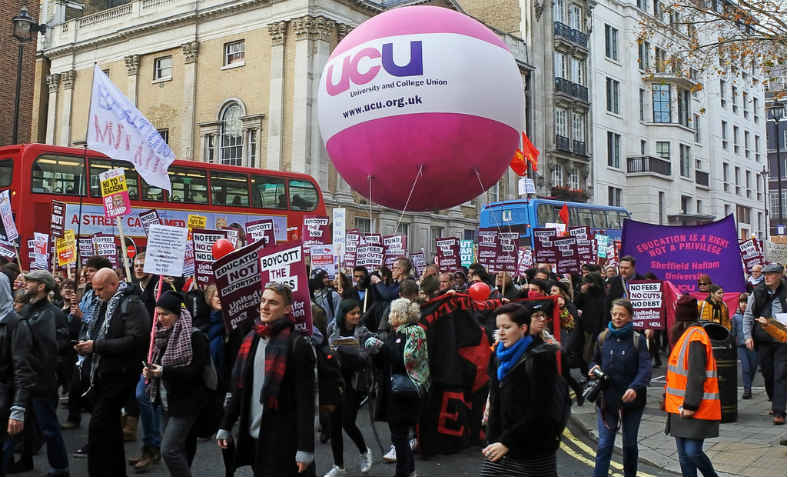 UCU balloon on demonstration, London. Photo: Dun.can
UCU balloon on demonstration, London. Photo: Dun.can
UCU members recently voted to suspend industrial action; the action may be on pause but the dispute is far from over.
The employers put a deal on the table agreeing to a ‘broadly comparable’ guaranteed pension (called a Defined Benefit) and the establishment of a ‘joint expert panel’ to determine the valuation of the USS pension scheme. The employers had previously tried to take away our guaranteed annual pension by moving staff onto a Defined Contribution scheme and they justified it on the basis of a highly contested valuation of the pension scheme last November.
The improved offer was entirely a result of our magnificent strike in the spring term, yet the most recent statements from USS make it clear that it is determined to stand by its November valuation and that it continues to insist that there is a large deficit that needs closing. The USS is now likely to impose increased cost sharing of contributions to the scheme of a total of 10.6% (with 3.7% on employees and 6.9% on employers). This is hardly ‘broadly comparable’ – it makes the defined benefit scheme less affordable and is effectively a 3.7% pay cut for staff who have already seen a de facto 15% pay cut over the last eight years with below inflation pay rises of 1%.
To make matters worse, USS has now insisted, again even before the Joint Expert Panel has been set up, that it can only make minor adjustments to the valuation assumptions, in an attempt to leave the ludicrous original valuation in place. It is worth noting that USS has become a giant pension fund who are not acting in the interests of university staff to whom they are ostensibly responsible, but instead acting in the interests of USS senior managers.
The UCU Joint Negotiation Committee met on the 27th of April to decide on the make up of UCU members of the joint negotiation panel. Union activists called for panel members to be democratically elected by the membership but this was blocked. Instead panel members will be appointed and will therefore not be accountable to the membership. Their dealings will be ‘confidential’ and non-transparent. We therefore cannot rely on the JEP to save our pensions. Instead we need to start organising for the next phase of industrial action. We have to remember that it was our sustained strike action that got the employers to the negotiating table in the first place and it was that action that also secured an improved second offer.
It now seems very likely that we will need further industrial action to win this dispute and protect our guaranteed pension. If USS refuse to budge on the increased contributions and the original pension scheme valuation, we need to call on the national leadership to re-ballot members for further industrial action next year, including sustained strike action in the autumn and spring term and an exams boycott in the summer term. We need to put pressure on our union leadership to make this happen, and there are two things all branches can do now: The first is to pass branch motions calling for a special Higher Education Sector Conference. This conference, made up of elected branch delegates, should determine the strategy of the dispute and its decisions should be binding. Just as members have been angered by the lack of transparency from USS, we have also been angered by the lack of democracy in the UCU’s handling of the dispute and we want democratic control of the dispute to go back to the branches and the membership. Branches have been transformed by this dispute and that new mood and those new voices need to be heard.
Secondly, all branches should pass motions calling for a National Disputes Committee made up of elected members, to which national negotiators and UCU Independent Expert Panels will report. Such a committee will help ensure accountability. We need to keep building our branches and the activist networks that grew out of the strike. This fight isn’t over yet. Now is not the time to take our eyes off the pension issue.

